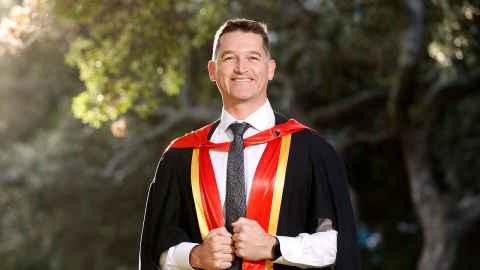Turbulent experience in Afghanistan inspires PhD study
13 May 2025
Dr Sam Mackay's surreal experience in Afghanistan inspired research that uncovers the hidden toll of expat life in conflict zones.

Sam Mackay lived in Kabul, Afghanistan’s capital between 2018 and 2019, working as a senior consultant for the United Nations.
"It was a roller coaster," he says. "One moment, I was running to a bunker during a terrorist attack; the next, I was part of meaningful work helping to reshape a country's education system. It was a mix of extremes, and no two days were the same.”
He noticed how life and work in the confines of fortified compounds affected people, and this complex and often bizarre experience inspired his doctoral research.
Sam graduated with his PhD from the University of Auckland Business School this May. His thesis, 'Sexcapades, Drug Hazes and Terrorist Attacks: Exploring Expatriate Work and Well-being in Fortified Compounds in a Hostile Environment' examines life inside Kabul's heavily secured compounds.
Drawing on interviews with 36 expatriates, including three New Zealanders and two Australians, his research provides rare insight into a world most people know little about.
Sam says the compounds, while designed to protect employees from external threats, often became sources of harm in their own right.
"I found that although they sheltered inhabitants from the risks outside, compounds generated additional threats on the inside, particularly in the inescapability of toxic bosses and colleagues, sexual harassment, racism and social exclusion."
Sam's interviews uncovered a range of coping mechanisms employed by international workers, from meditation and gardening to drug use, binge drinking and casual sexual encounters, what several participants called "sexcapades."
These insights weren't easy to obtain; Sam spent hours interviewing study participants, generating nearly half a million words.
"When you're overwhelmed by the data, it can feel like being lost in a deep, dark forest," he says. "Luckily, I had supervisors who could drop some breadcrumbs to help me find my way through."
My research shows the limits of compounds as an effective strategy to protect employees in hostile environments.
Sam chose the University of Auckland Business School for his doctoral studies largely because he wanted to learn from world-leading academics, particularly human resource management expert Professor Peter Boxall.
"He's one of the top-ranked experts in international human resource management and has helped shape the field. I was keen to learn from his incredible depth of knowledge, and he was hugely supportive throughout.
"Associate professor Helen Delaney, who taught our qualitative methods course, was also fantastic, and my other supervisor, Dr Peter Smith, was excellent and brought valuable real-world insight from his time in the army."
Sam also credits the support of fellow doctoral candidates and the family and friends who were there for him throughout the process. His mother, Linda Miller, works for the University of Auckland, adding a special resonance to his graduation, and his dad, Don Mackay, who also gained a PhD, provided inspiration.
"Doing my PhD was always in the back of my mind - like the final frontier of my education journey," he says. "My dad did his PhD on battlefield preservation in Gallipoli, so I saw firsthand what the process involved and was inspired by him.
"I also really appreciated the collegial support from others doing the doctorate alongside me," says Sam.
"I started at the same time as several others in the Business School, and our journeys were quite similar. Our supervisor had a group of five of us. In that first year, we'd meet regularly over coffee to share research and ideas. It was a great way to build connections, swap tips, and support each other through the challenges. I'm now graduating alongside two of them."
Since submitting his thesis, Sam has taken a well-earned break, travelling through Europe, Indonesia, Australia and New Zealand.
He's now one month into a new role in Te Herenga Waka Victoria University of Wellington's international office, working in international strategy and performance.
"I think my doctoral experience has given me a good insight into academia, which is going to serve me well in this area."
Sam hopes his research can inform how aid and development agencies operate in conflict zones.
"My research shows the limits of compounds as an effective strategy to protect employees in hostile environments. I hope the findings will contribute to improving expatriates' experiences in these extreme contexts."
Media contact:
Sophie Boladeras, media adviser
M: 022 4600 388
E: sophie.boladeras@auckland.ac.nz